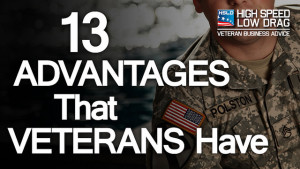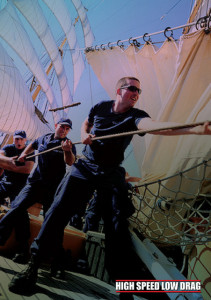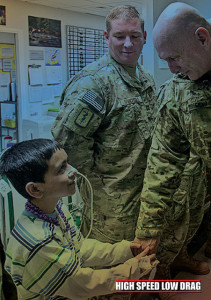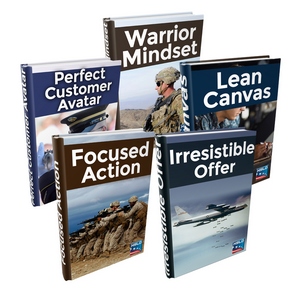This post is based on the video – 13 Veteran Advantages: What Veterans Can Use To Get Ahead In The Civilian World
Hi. I’m Antonio Centeno. I’m one of the founders of High Speed Low Drag along with John Lee Dumas of Entrepreneur on Fire, and Tom Morkes of Insurgent Publishing.
We’ve been putting together some great content that can help you make a kick butt transition from the military into the civilian world.
It doesn’t matter if you’ve been out for one month or if you’ve been out for two decades. The information we’re putting out guys is going to be super useful and if you want more go check out our high-level Mastermind “High Speed Elite.”
This is a really cool ride into our group, but there is some one-on-one training. It’s something that we only up a couple of times a year. We’re really proud of it. Helping that makes a difference.
Click here to watch 13 Veteran Advantages: What Veterans Can Use To Get Ahead In The Civilian World video on Youtube.
Okay, guys. Let’s get into this, 13 advantages that veterans have. Now, this is in support of my article. That articles goes in about over 2,000 words so I’m not going to go super detailed here but I do want to give these so that you can maybe see a few of these that you have and know that, hey, I can get out there and I can do anything.
We see so many veterans get out and they really limit themselves. I’ll talk about this in another video.
The number one thing that holds veterans back is their mindset but there are some competitive advantages that you’ve developed as a veteran that you can take into any job.
Number one is leadership.
You’ve probably heard this before. I mean, nowhere else, I don’t think there’s anything else where you are thrust at such a young age into a position of leadership. I have seen 22-year-old lieutenants make decisions which really impact world politics.
I have seen 19-year-old lance corporals go out there and lead the charge, basically make things happen, going from house to house in Iraq and just amazing leadership that other people want to get up and follow their lead.
You just can’t compare that to when someone talks about in the civilian world they did an all-nighter and they had their team who was so proud. It’s just no comparison. So leadership, you have got it made but you’ve got to be able to translate that into civilian terms and translate it into their words.
Number two, responsibility.
We have had the type of responsibility in which people’s lives depended on it. If you’re a bomb tech and you’re attaching those things to an F18, you know that not doing this right can lead to a catastrophic failure.
Everything we do — so if you were in special ops, if you were in supply chain management, guys, you understood that it was about the team because the guys over in supply, guess what?
If they didn’t make things happen, then we had the guys at the tip of the spear not going out with what they needed and that could lead to – I’m sure you guys know what it’s like to have a team mentality. Even pilots in the Marine Corps, they know that their job is to support the boot on the ground.
Number four, work ethic.
Twenty-four hour duty, we did it all the time. When people complain about, “Oh, I don’t know about working more than eight hours,” we’re just laughing here. Okay. Y
ou knew how to put in the time. You go on a six-month deployment, that was six months of work. There wasn’t a day off. Even on your day off you were finding ways to get sharper, to get better. So you’ve got the work ethic.
All right. Number five, integrity.
Integrity just comes with it. It’s something that we understand. Let’s say if you were to lie, if you were to deceive someone, I mean as an officer, that’s conduct unbecoming an officer. You literally will get booted out and go to jail for something like that. But most us come in. We were already pre-selected. We wanted to serve a greater purpose and we had integrity.
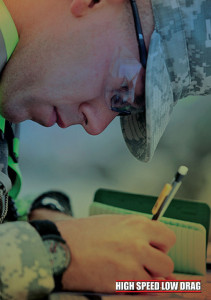 Number six, accelerated learning.
Number six, accelerated learning.
I was speaking with a buddy of mine, Joe. He was in the Air Force and he was talking about how he would get – I mean, we got transferred every three years, every two years. You’re showing up with an MOS.
Now you’ve technically got the basic skills for this or sometimes you don’t and you would have to go back and learn this and dive in and become an expert in this particular item so that you could be teaching it, so that you could be working with others.
Yes, it was no problem when you would show up and, okay, I don’t necessarily have the background training but I’m going to find a way to make this work.
Number seven, respect for procedure.
Any pilot can tell you what the NATOPS are – or at least any naval aviator can.
NATOPS is written in blood and that is the procedures you go through when you’re starting an aircraft, when you’re flying an aircraft, and whenever an aircraft is going down and what emergency procedures are.
NATOPS is written in blood because everything that’s been learned in there usually has resulted because of an accident so you understand how important it is to go through checklists and procedure because it literally saves lives.
Okay. So, number eight, talking about performance under pressure.
Guys, when you’ve gone through bootcamp, when you’ve gone through any type of live fire exercise, you know what pressure is literally. You make a mistake, if someone goes into the line of fire, if you are not careful about where your weapon is aimed, someone will die.
We have things that happen. You understand that there are certain ways to turn off a truck. Otherwise, a marine who’s between two vehicles – and we had this accident happen – could get crushed. You understand that there is a way to do things, there are SOPs, and lives are on the line.
Number nine, loyalty.
Guys, we are loyal because we realize that it’s something that, yeah, some people are going to go through but we stand by each other. We never leave a man out there.
We realize that, yes, it may not always make logical sense but it’s one of those things that we’re going to see this through. We believe in someone. We’re loyal to each other’s training and to what we represent. It doesn’t matter if you’re a Green Beret or a Navy Seal or if you’re a sapper. I mean, you understand that, hey, I’m going to trust in this person and they’re going to come through.
Perspective. Number ten. Perspective. A lot of people worry about their cars. They worry about their homes. They worry about these things that are all very material. We understand what’s important and that’s life, that’s being able to spend time with those you care about, and being able to live a peaceful life.
We’re the type of people – and, unfortunately, it’s going to be sometimes a negative thing because in the civilian world, you can be taken advantage of but we’re not out there to get credit.
We are out there to work as a team and we don’t mind – in fact, most of us are not that guy at the tip of the spear.
We realize that behind every silver star, every medal of honor, every award that’s given are the staff sergeants, the gunnery sergeants, the sergeant majors who trained those young marines, those young sailors, those young airmen, those young soldiers and taught them. We’re selfless. We feel that that is an award for all of us and we’re proud.
Courage.
Kind of self-explanatory but we go into this – it’s not that we’re stupid or we’re reckless, we simply realize that someone’s got to stand up and we’re that someone.
Okay. Thirteenth one. What do you think it is? This one comes really, it’s in a bit the camaraderie that we have when we are serving but even more importantly, when you leave the relationship, the connection.
I get 200 emails a day. A lot of guys want to talk to me from my other company, Real Men Real Style. I own another company called Bilingual Kids Rock. I’ve got High Speed Low Drag, this company.But I make time for veterans. If a veteran reaches out to me, I open up my calendar. I find a way to get them in. Guys, do not be enlaced. Do not be afraid to leverage your connection with veterans. We want to help each other.
So, guys, those are your 13 advantages. Let me know what you think. I’d love to hear from you in the comments. See you in the next video. Bye-bye.
Click here to watch 13 Veteran Advantages: What Veterans Can Use To Get Ahead In The Civilian World video on Youtube.
